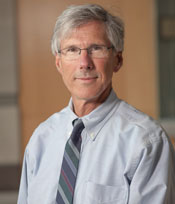
Daniel Kirsch, MD
The college years can be stressful: More than half of college students have experienced “overwhelming anxiety” and about one-third reported they felt “so depressed that it was difficult to function” at some point during the year, according to a 2013 survey by the American College Health Association.
But despite this and other reports suggesting that depression has reached epidemic proportions among college students, UMass Medical School psychiatrist Daniel Kirsch, MD, believes many of these students are experiencing developmentally normal, age-appropriate psychological distress, rather than full-blown clinical depression.
“It’s not always easy for even trained clinicians to initially differentiate between biological depression and someone in distress,” said Dr. Kirsch, associate clinical professor of psychiatry and director of the UMMS College Consultation Service, which serves seven area colleges.
“Understanding how the brain develops throughout adolescence allows us to see that in emerging adults, the fully developed emotional systems initially overpower the slower-developing cognitive functions,” he explained. “Therefore emerging adults are more likely to experience and express psychological distress.”
Kirsch urges a deliberate and cautious approach to addressing a student’s emotional symptoms, noting there are many treatment options besides antidepressant medications.
“Whether we are treating a mental illness, or an expectable and possibly normal variation of an age-appropriate experience, watchful waiting is an effective and accepted first line treatment for mild to moderate depression—and the treatment of choice for distress,” he said. “I don’t have to pull out the prescription pad on the first visit.”
Kirsch first recommends that his young adult patients try evidence-based, non-medication interventions that include:
- Wellness basics such as getting enough sleep, eating well and getting some exercise. The key here is to embrace activities that are doable rather than overwhelming for someone who is already distressed. “So if you’re not doing any exercise, try to do a little bit,” suggested Kirsch.
- Avoiding substances as a way to cope. “These are college students, so when I talk to them I know they likely drink,” Kirsch noted. “So it is a matter of how much, when and why—don’t make things worse, treat your brain nicely.”
- Trying relaxation techniques. “Young adults are aware of the mind/body connection,” said Kirsch. “Every school offers meditation and yoga classes or groups.”
- Researching self-help resources. “Web-based resources are good for tech-savvy kids and self-help literature—a.k.a. bibliotherapy—has become really sophisticated,” according to Kirsch.
- Talking to someone instead of suffering in silence. “We know that students’ hierarchy of who they’ll talk to puts professionals last on the list, but it’s important they talk to someone, whether a friend or a counselor,” Kirsch emphasized.
Kirsch highly recommends that students experiencing symptoms of emotional distress visit their school’s onsite counseling services.
“Most schools have counseling services available with personnel specifically trained to help the college population, who are there by choice because they enjoy helping young people,” he said. “They are an excellent resource, especially for the psychologically distressed student who doesn’t necessarily have clinical depression.”
As for if and when to prescribe medications, Kirsch said, “Antidepressant medications are extremely effective and quite safe, but even as a psychiatrist, I am concerned about sending a message to emerging adults that the answer to life’s challenges lies in medications.”
Rather, Kirsch said, “The message I give is to shift from being a passive victim to an active participant. Actually doing something is a start towards feeling better. Picking up the phone to make an appointment with a counselor is a shift to activity. Being thoughtful about your drinking is a shift to activity. Enrolling in a yoga class is a shift to activity. Taking action is hugely therapeutic, giving a feeling of starting to be in the driver’s seat.”